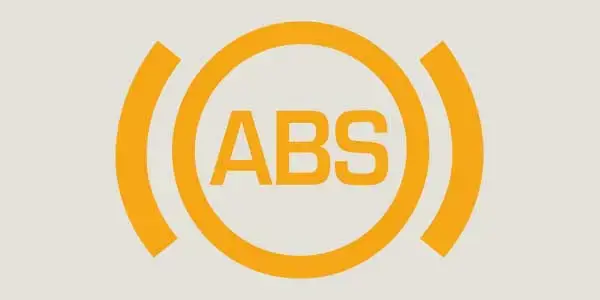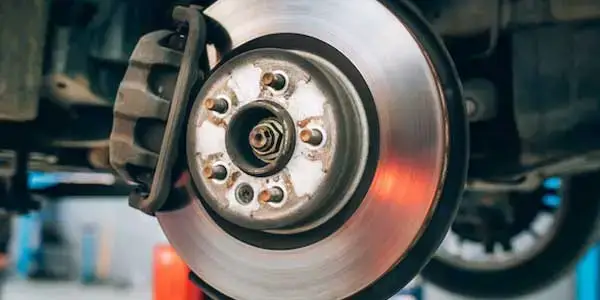One of every driver’s worst nightmares is losing control of their vehicle on the highway. If you detect a loss of braking power while driving, it could be due to a brake pipe leak.
In this article, we will discuss how to fix brake power low, what it means if braking power is low, and why you are experiencing braking power low.
What is Braking Power Low Meaning?
Low braking power is frequently the result of failing brake lines, brake fluid, or brake oil issues. In addition to these, broken vacuum pumps, master cylinders, and brake pads all contribute to this issue.
It’s important to maintain your brakes and have them checked frequently as the manufacturer recommends. Braking power is lost when the brake system is broken. Broken brake lines are one of the related components that usually cause problems since they connect the cylinders and the brake pads. You can fix these problems by changing the new one or carrying out an in-line cleaning.
Possible Causes of Low Braking Power
The Brake Fluid Level Is Low
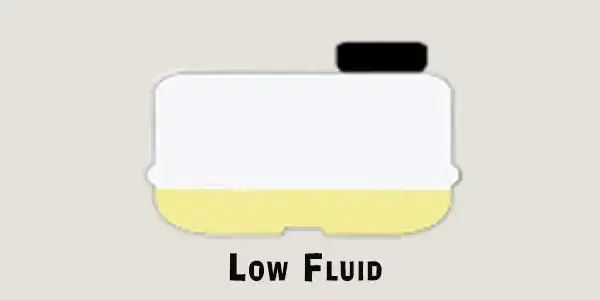
The braking power is transmitted from the pedals to the wheels by the brake fluid. It’s in a brake line that connects all four wheels.
Because these brake lines are composed of steel, they are prone to corrosion. Extreme corrosion will cause microscopic holes in the brake lines, allowing the braking fluid to escape.
If the brake fluid runs low, the amount of braking force that reaches the wheels is reduced.
As a result, you may notice a low braking power indicated on the dashboard of your vehicle. You can increase brake power by filling off the brake fluid.
However, because you haven’t repaired the brake lines, this is only a temporary workaround.
To prevent topping up the fluid now and then, it is best to patch the holes or replace the complete brake line.
Brake Line Obstruction or Bend
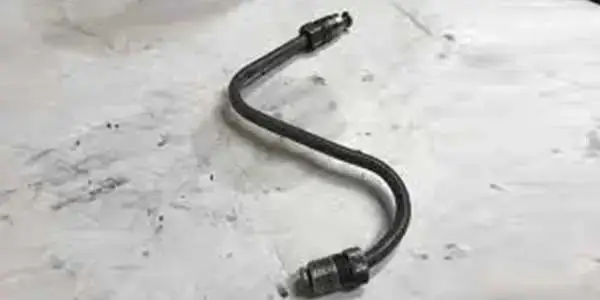
To create optimal braking power, the brake fluid should flow freely through the brake lines. Accidents, on the other hand, might bend the brake lines.
Overheating can also cause the brake fluid to burn and solidify, clogging the brake lines.
Such incidents will disrupt the flow of the brake line, resulting in insufficient braking power.
The good news is that flashing the contaminants out of the brake lines will solve the problem.
However, if the brake line is bent, it is best to replace it because bending it back may break it or make it weak.
There Is Air in the Brake Lines
When you have low braking power, you should also be concerned about air in the brake lines.
Air can enter the brake lines in a variety of ways, including during maintenance. Furthermore, the brake fluid absorbs ambient water, lowering its boiling point.
As a result, it boils and produces water vapor. Water vapor, as you may know, is composed of oxygen.
This oxygen will occupy the area in the brake lines, softening them. Fortunately, you do not need to take the automobile to a mechanic to resolve this issue.
All you have to do is flush the brake fluid, a process known as bleeding, to remove air from the brake lines and restore ideal stopping force.
Vacuum Pump Failure
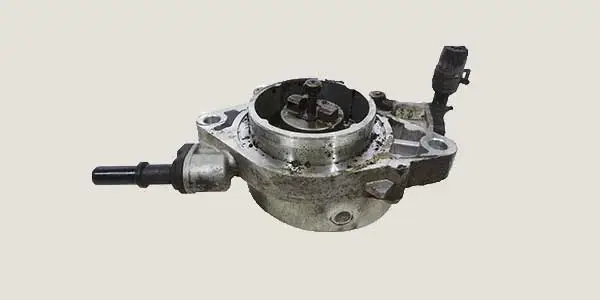
The vacuum pump’s job is to remove the air from the vacuum booster, resulting in a vacuum.
This vacuum will allow you to increase brake power, requiring less effort.
If the vacuum pump malfunctions, braking power will be reduced, especially if you do not apply a strong force to the brake pedal.
Fortunately, a vacuum gauge can rapidly determine if the vacuum pump is defective. However, to avoid mistakes, make sure you use your car’s manual.
If the vacuum pump is causing poor braking power, it must be replaced promptly because it is a serious safety concern.
It is advisable to get an expert to fix it because it must be done correctly.
The Master Cylinder Faculty
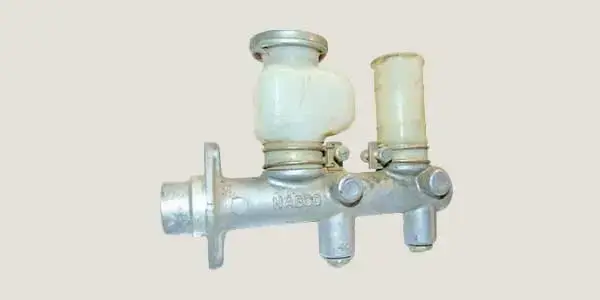
The primary function of the master brake cylinder, which is an important engine component, is to store brake fluid and generate hydraulic pressure. Any problem with this component will result in a loss of braking capability.
External force and prolonged use can also cause the cylinder to break. Both of these factors contribute to the loss of hydraulic pressure or fluid leakage.
Worn Brake Pads
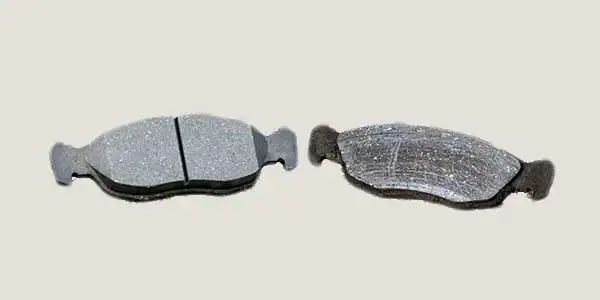
The brake pads are the components that push the disc rotors, causing friction and causing the car to stop.
If you want your vehicle braking system perform the best possible function and effective, Brake pads must be in top condition.
Unfortunately, because the brake pads are constantly in contact with the rotors, they tend to wear down with time.
It is important to note that the amount of wear depends on the quality of the material and how you drive the car.
To see if a brake pad is worn, measure its thickness and compare it to the correct thickness.
A highly worn brake pad will not exert enough fiction on the rotors. When you press the brake pedal, your car’s braking power will be reduced.
As a result, if the thickness of the brake pad has been reduced, replace it immediately to resolve the braking issue.
A Faulty Valve
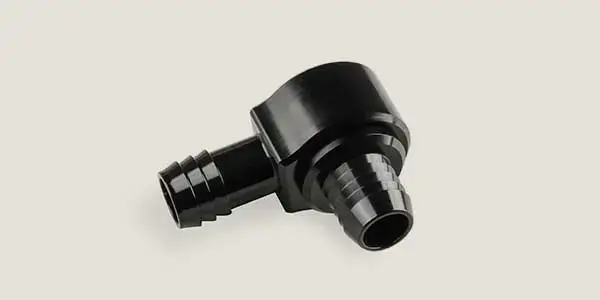
The brake booster check valve is a component of the vacuum booster.
This valve is responsible for three critical functions in the braking system: removing pressure buildup, withdrawing air from the master cylinder, and maintaining a vacuum.
These roles guarantee that braking power is maximized. As a result, if the valve fails, the vacuum in the brake booster is lost, resulting in insufficient braking power.
Although this valve is intended to last the life of your vehicle, it can be damaged by certain mechanical difficulties.
A malfunctioning booster check valve must be replaced if you have a spongy brake pedal followed by an engine stall.
Unfortunately, this feature is hidden deep within the vehicle, so you may need the assistance of a professional to access it.
The Electronic Control Module (ECM) Is Broken
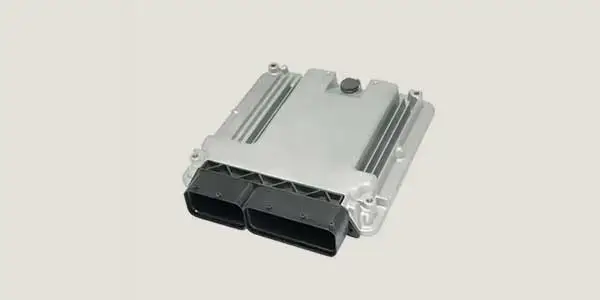
The ECM controls the braking mechanism in modern vehicles. As a result, depending on how hard you press the brake pedal, the ECM will increase or decrease braking power.
However, the ECM can malfunction and reduce braking power instead of increasing it.
So, if all of the other components are excellent, you should investigate the state of the ECM.
In some cases, the problem is caused by a software error in the ECM, and restarting it would resolve it.
The Antilock Braking System (ABS) Has Been Turned On
The ABS should only be activated when braking at high speeds. It controls the opening and closing of booster valves to modulate braking power.
It can, however, malfunction and activate itself even when travelling at a normal speed.
Fortunately, a failing ABS is easy to detect because its performance is not noticed when braking hard. As a result, restoring it will eliminate the low braking power.
However, because the ABS is a sophisticated component that requires expert technical knowledge, it is preferable if you leave it to a specialist.
Speed Sensor Failure
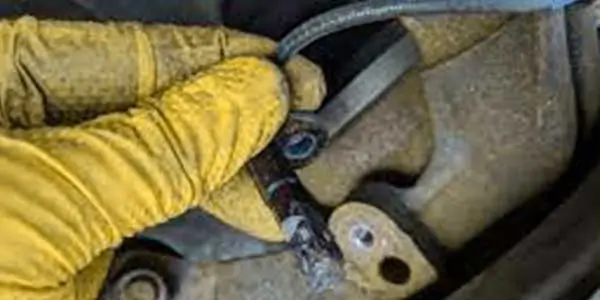
The speed sensor receives information about the speed of the wheel and delivers it to the ECM and ABS. As a result, the braking power generated is determined by its information.
As a result, if the speed sensor fails, it will not convey this information to the two components. It may also send incorrect information.
For example, if you reduce the speed of the wheel by pressing the brake pedals, the malfunctioning sensor may not correctly capture the deceleration rate, resulting in insufficient braking power.
As a result, you should verify the speed sensor and fix it as needed to improve braking power.
Worn Brake Rotors
To stop the wheels, the rotors function in tandem with the calipers and brake pads.
When you press the brake pedals, the brake pads press against the rotors, causing the wheels to stop.
However, the friction caused will eventually wear down the rotors.
If your rotors become worn, you will have reduced braking power because there will be less contact between the rotors and the brake pads.
As a result, you will need to replace the worn rotors in order to improve braking power.
How to Fix Braking Power Low?
The Brake Fluid Level Is Low
Find the cause of your fluid levels lowering first, then fix it. The fluid leak may be brought by tiny cracks in the brake line that transports the fluid. If so, you should replace the line before filling off your braking fluid again.
Brake Line Obstruction or Bend
Find out what caused a brake line to become clogged first. Find and fix the underlying problem if the solid residue is caused by overheated and burned brake fluid, which is the most frequent problem.
One of the main offenders in this case is water contamination. You see, water is less heat resistant than pure brake fluid. The fluid’s heat resistance level decreases as a result of mixing with water, which causes it to swiftly overheat and burn, leaving behind a solid substance that obstructs the line.
Here, changing your brake fluid is the recommended course of action. Reminder: stay away from poor quality products that don’t contain pure brake fluid. However, if the line is bent you’ll need to hire a mechanic to correct it. That can happen for a number of reasons, including accidents.
There Is Air In The Brake Lines
Identify the source of the air entering the brake line first. Small holes in the line are the most frequent cause. The line and the fluid can both be changed to resolve this.
Vacuum Pump Failure
As said earlier if the problem against braking low power is due to vacuum pump failure then required immediate replacement of the vacuum pump. However it is strictly advisable to replace the pump from the expert mechanic. Don’t try DIY unless you have sufficient experience and confidence before replacing pump
The Master Cylinder Faculty
Consult with the expert mechanic.
Worn Brake Pads
Your brake pads need to be replaced.
A Faulty Valve
A malfunctioning booster check valve must be replaced if you have a spongy brake pedal followed by an engine stall.
Unfortunately, this feature is hidden deep within the vehicle, so you may need the assistance of a professional to access it.
Worn Brake Rotors
Replace your worn brake rotors.
ECM, ABS and Speed Sensor
All these are related to software errors except ABS, However you cannot fix it by yourself unless you have proper equipment and knowledge of mechanical and technical expertise.
Better to consult with expert professional to solve this issue.
Braking Power Low Stop in a Safe Place Toyota
Braking Power Low. Stop in a Safe Place. See Owner’s Manual – What to do?
“Low Braking Power.” Stop in a Secure Location. If it says “See Owner’s Manual,” there might be a braking issue with the car. In a secure location, the leak should be immediately stopped. You should speak with your agent as soon as possible. If you keep operating the car, it can be highly risky.
Braking Power Low Car Won’t Start
The “engine” is unconnected to and distinct from the brake system. The car would still start even if all of the brakes were removed. Consequently, unless the mechanic worked on components of the automobile other than the brake system, such the engine, the no start issue you’re experiencing is just coincidental.
Last Verdict
When a problem appears, there are several things you can do on your own. However, there are some situations where using a professional outside source is a good idea.
Without fluid, the brake system cannot function properly. The liquid can therefore be replaced every three to four months. Once the pads begin to deteriorate, there is just one course of action left: replacement.
Modern engines must have third-party maintenance, such as vacuum boosters and master cylinders. Bring the vehicle to the shop for a complete inspection.
Frequently Asked Questions:
How can I improve my braking power?
- Expand the disc’s radius. Larger discs will provide greater braking torque since the brake pad will exert pressure over a wider area, generating a greater moment.
- Increase the area of the caliper piston.
- The line pressure.
- Roughness of the contact between the pad and the rotor.
Why are my brakes not stopping fast enough?
One of the most frequent reasons of spongy brakes is air in the brake lines. To stop moving cars, braking systems rely on hydraulic pressure that is applied evenly. This pressure equilibrium can be disturbed by air in any of these lines. Poor pressure may increase stopping distance, time, and/or effort.
Does ABS improve braking power?
In short answer yes, it will help to improve the braking provides better vehicle control and shortens stopping times.
What are the 3 main factors for braking performance?
- Speed and weight of your vehicle,
- Brake adjustment
- Anti-lock braking systems.
What are signs of brake problems?
- Leaking Fluid.
- Spongy or Soft Brakes.
- Car Pulling to One Side When Braking.
- Burning Smells.
- Brake Light On.
- Squealing or Squeaking Noises.
- Grinding Noises.
- Wobbling or Vibration When Braking.

